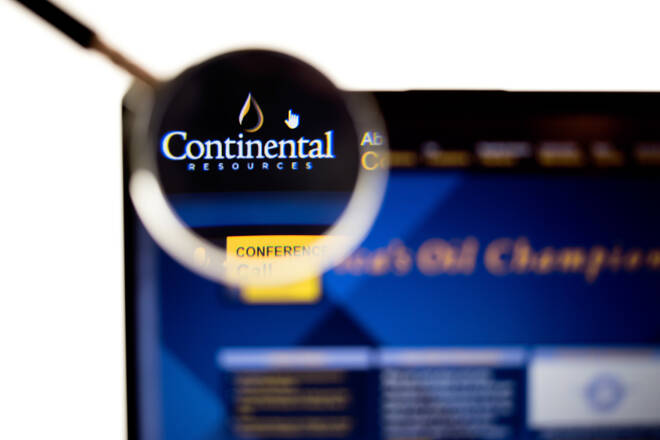Advertisement
Advertisement
Continental Resources Posts a Net Loss of $239.3 Million in Q2 Due to COVID-19 Slowdown
By:
Continental Resources Inc, an American petroleum and natural gas exploration and production company, reported a net loss of $239.3 million in the second quarter as the COVID-19 pandemic cut fuel demand and hammered oil prices, sending its shares down about 1% in after-hours trading.
Continental Resources Inc, an American petroleum and natural gas exploration and production company, reported a net loss of $239.3 million in the second quarter as the COVID-19 pandemic cut fuel demand and hammered oil prices, sending its shares down about 1% in after-hours trading.
“Continental Resources’ 2Q showed dramatically lower EBITDAX than expected with oil vols -9%< consensus as more activity was deferred than expected, particularly in the more oil-prone Bakken. Cash flow is effectively deferred into 2H as Continental Resources guides to 10% higher production vs. cons. D&C maintenance capex is guided to $1.2 billion for 2021, roughly $200 million higher than our prior model but still be FCF generative at $40/bbl,” said David Deckelbaum, equity analyst at Cowen.
Continental Resources shares closed 2.02% higher at $17.64 on Monday, still down about 50% since the beginning of 2020.
The Company reported a net loss of $239.3 million, or $0.66 per diluted share, for the quarter ended June 30, 2020. In second-quarter 2020, typically excluded items in aggregate represented a decrease of $16.4 million, or $0.05 per diluted share, in Continental’s reported net loss. Adjusted net loss for the second quarter of 2020 was $255.7 million, or $0.71 per diluted share.
The largest producer in North Dakota’s Bakken basin said during the second quarter, approximately 55% of the company’s operated oil volumes were shut-in, or approximately 7.8 MMBo. In the second quarter of 2020, total energy production averaged 202,815 Boepd, oil production averaged 95,174 Bopd and natural gas production averaged 645.8 MMcfpd.
Executives’ comments
“By deferring volumes in the second quarter of 2020, we expect to generate an estimated $90 million in incremental cash flow from operations at $40 WTI. Combined with our strong asset position and unmatched shareholder alignment, we believe Continental’s equity reflects an uncommon value,” said Bill Berry, Chief Executive Officer.
“While our debt increased modestly due to the pandemic, it has not changed our long-term strategy to continue focusing on debt reduction, with a total debt target of $5.4 billion to $5.5 billion by year-end 2020,” said John Hart, Chief Financial Officer.
Continental Resources stock forecast
Sixteen analysts forecast the average price in 12 months at $16.50 with a high forecast of $23.00 and a low forecast of $12.00. The average price target represents a -6.46% decrease from the last price of $17.64. From those 16, one analyst rated ‘Buy’, ten analysts rated ‘Hold’ and five rated ‘Sell’, according to Tipranks.
Morgan Stanley target price is $8 with a high of $19 under a bull scenario and $1 under the worst-case scenario. Cowen and company gave the price target of $13.5.
Several other equity analysts have also updated their stock outlook. Piper Sandler raised target price to $14 from $4. Continental Resources had its target price upped by Citigroup to $18 from $13. The firm currently has a neutral rating on the oil and natural gas company’s stock. TD Securities raised its target price to $14.50 from $13.50 and gave the stock a hold rating.
We think it is good to hold for now as 100-day Moving Average and 100-200-day MACD Oscillator signal a mild selling opportunity.
Analyst comment
“Higher relative exposure to low oil prices. Lack of hedges offers outsized exposure should oil prices recover, though weighs on the cash flow profile in our base case. Low oil prices weigh on net asset valuation. On our commodity price deck of $42.50, CLR’s net asset value suggests intrinsic downside from current trading levels,” said Devin McDermott, equity analyst and commodities strategist at Morgan Stanley.
“Premium not warranted. CLR is trading at a premium to Permian peers, which we believe is unwarranted given its asset base, lack of downside protection, and elevated leverage,” he added.
About the Author
Vivek Kumarauthor
Vivek completed his education from the University of Mumbai in Economics and possesses stronghold in writing on stocks, commodities, foreign exchange, and bonds.
Advertisement
